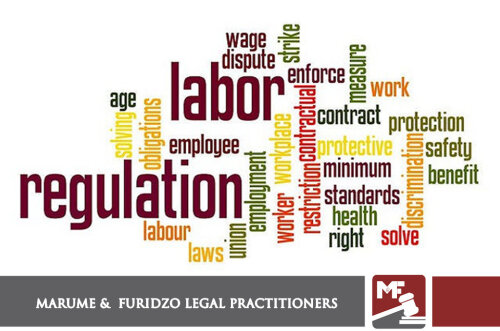Best Employment Rights Lawyers in Harare
Share your needs with us, get contacted by law firms.
Free. Takes 2 min.
List of the best lawyers in Harare, Zimbabwe
About Employment Rights Law in Harare, Zimbabwe
Employment Rights Law in Harare, Zimbabwe, is primarily governed by the Labour Act [Chapter 28:01]. This legislation sets out the legal framework for the employment relationship, including terms and conditions of employment, workers' rights, employers' obligations, dispute resolution mechanisms, and protections against unfair labor practices. The primary objective is to promote fair employment practices, safeguard the welfare of workers, and ensure equitable negotiations between employers and employees. Understanding these laws can help both employers and employees in navigating their roles and responsibilities effectively.
Why You May Need a Lawyer
There are several situations where individuals in Harare might require legal assistance with employment rights. Common scenarios include experiencing or witnessing discrimination in the workplace, dealing with unfair dismissal or wrongful termination, negotiating employment contracts, addressing concerns of unpaid wages or benefits, handling workplace harassment or unsafe working conditions, and resolving disputes through mediation or legal proceedings. A lawyer specializing in employment law can offer crucial guidance, ensuring that your rights are protected and that any issues are handled according to the law.
Local Laws Overview
The Labour Act in Zimbabwe encompasses several key aspects that are important for workers in Harare to know. This includes regulations on working hours, minimum wage requirements, occupational health and safety standards, procedures for hiring and firing employees, guidelines for collective bargaining, maternity and paternity leave entitlements, protection against unfair labor practices, and dispute resolution through labor courts. Understanding these local laws is vital to ensuring compliance and protecting employment rights effectively.
Frequently Asked Questions
What are my rights if I am unfairly dismissed?
If you believe you've been unfairly dismissed, you have the right to appeal the decision through a formal grievance process or take your case to the Labour Court for resolution.
How can I address workplace discrimination?
Report the matter to your HR department or a labor union representative. If unresolved, seek advice from a lawyer specializing in employment law who can guide further legal action.
What is the procedure for filing a workplace grievance?
A grievance should be filed in writing, specifying the complaint and proposed solutions. Follow the company's internal grievance procedures or consult a lawyer for assistance.
Are there minimum wage laws in Harare?
Yes, the Labour Act sets minimum wage standards that can vary by industry. It's important to consult the latest regulations to understand your entitlements.
What should be included in an employment contract?
Key elements include job role, working hours, salary, benefits, termination conditions, and any employment policies or company rules.
How does the Labour Act protect maternity rights?
The Labour Act provides maternity leave and protects against discrimination due to pregnancy. Employers must adhere to these regulations to ensure employee welfare.
Can my employer change my employment contract terms without my consent?
No, any changes to the terms and conditions of an employment contract require mutual consent from both the employer and employee.
What should I do if I'm experiencing workplace harassment?
Document instances of harassment and report them to your employer or HR department. Legal advice should be sought if the issue persists and is unresolved.
What steps can I take if my employer is not paying my wages?
First, address the issue with your employer. If unresolved, consider seeking assistance from a trade union or pursuing legal action to recover owed wages.
What are occupational health and safety obligations for employers?
Employers must provide a safe working environment, conduct regular safety training, and ensure compliance with existing health and safety regulations.
Additional Resources
For additional support, you can reach out to the Ministry of Labour and Social Welfare, consult with trade unions, or contact local non-governmental organizations dealing with workers' rights. These entities can provide information, support, and referral services.
Next Steps
If you require legal assistance with employment rights, consider consulting with a qualified employment lawyer in Harare. Start by researching local legal experts, checking their credentials, and scheduling a consultation to discuss your situation. Preparing all relevant documents and having a clear idea of your objectives can help in efficiently addressing your concerns.
Lawzana helps you find the best lawyers and law firms in Harare through a curated and pre-screened list of qualified legal professionals. Our platform offers rankings and detailed profiles of attorneys and law firms, allowing you to compare based on practice areas, including Employment Rights, experience, and client feedback.
Each profile includes a description of the firm's areas of practice, client reviews, team members and partners, year of establishment, spoken languages, office locations, contact information, social media presence, and any published articles or resources. Most firms on our platform speak English and are experienced in both local and international legal matters.
Get a quote from top-rated law firms in Harare, Zimbabwe — quickly, securely, and without unnecessary hassle.
Disclaimer:
The information provided on this page is for general informational purposes only and does not constitute legal advice. While we strive to ensure the accuracy and relevance of the content, legal information may change over time, and interpretations of the law can vary. You should always consult with a qualified legal professional for advice specific to your situation.
We disclaim all liability for actions taken or not taken based on the content of this page. If you believe any information is incorrect or outdated, please contact us, and we will review and update it where appropriate.















